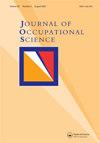在以职业为中心的研究中代表老年人的非正式照顾者:一个关键的解释性综合
IF 2.4
Q1 SOCIAL SCIENCES, INTERDISCIPLINARY
引用次数: 1
摘要
在当前的人口和政治背景下,西方国家在提供老年人护理方面可能会越来越依赖非正式护理人员。这一批判性的解释性综合探讨了非正式护理是如何在基于职业的文献中被概念化和研究的。我们在5本以职业为重点的期刊上搜索了关于老年人非正式照顾的文章,得到了17篇主要研究文章。对这些文章的分析表明,人们越来越关注照顾者的经历(而不是照顾者和被照顾者之间的分裂焦点),交易视角和共同职业的探索扩大了这一领域的文献范围。这种综合表明,需要更多地关注非正式照顾者之间的多样性,特别是与性别和性别认同有关的多样性,并引起人们对社会权力关系中非正式照顾缺乏批判性关注的关注。职业视角可以通过产生关于该职业如何与环境和政治因素相关的知识来促进非正式护理的研究,并有可能阐明护理者和护理接受者的职业含义。本文章由计算机程序翻译,如有差异,请以英文原文为准。
Representing informal caregivers of older adults in occupation-focused research: A critical interpretive synthesis
ABSTRACT Within the current demographic and political context, it is likely there will be increasing reliance on informal caregivers in the provision of care to older adults in Western nations. This critical interpretive synthesis explored how informal caregiving has been conceptualized and researched in the occupation-based literature. Five occupation-focused journals were searched for articles on informal caregiving for older adults, resulting in 17 primary research articles. Analysis of these articles revealed that there has been an increasing focus on the experiences of caregivers (as opposed to divided focus between caregivers and care recipients) and that transactional perspectives and exploration of co-occupations have expanded the scope of the literature in this field. This synthesis points to a need to turn greater attention to diversity among informal caregivers, particularly in relation to gender and gender identity and raises concerns regarding lack of critical attention to informal caregiving as embedded in social relations of power. An occupational perspective can contribute to research on informal caregiving by generating knowledge regarding how this occupation is shaped in relation to contextual and political elements and has the potential to illuminate implications for the occupations of caregivers and care recipients.
求助全文
通过发布文献求助,成功后即可免费获取论文全文。
去求助
来源期刊

Journal of Occupational Science
SOCIAL SCIENCES, INTERDISCIPLINARY-
CiteScore
4.30
自引率
41.70%
发文量
46
 求助内容:
求助内容: 应助结果提醒方式:
应助结果提醒方式:


